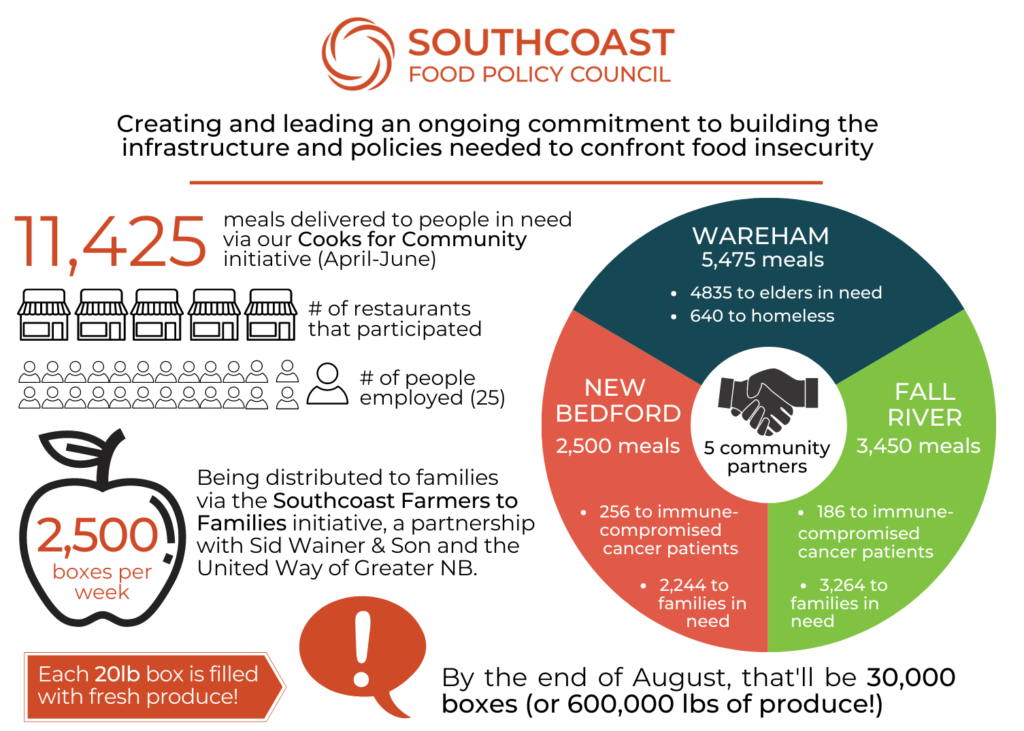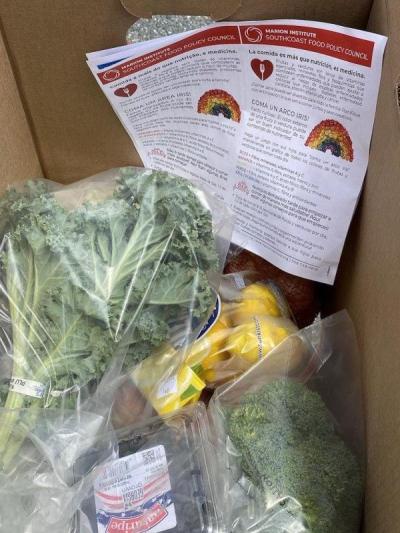Community Spotlight: SouthCoast Food Policy Council
During these uncertain times, it is important to look around and learn about the powerhouse organizations putting the pedal to the metal to make an impact where it is most needed. Today we are highlighting the tireless efforts of The Marion Institute and SouthCoast Food Policy Council as they march through this pandemic to provide for those in need, and advocate to make this process easier for others in the future.
We had the opportunity to ask the folks at The Marion Institute a few questions about the program. Read on for a better understanding of the work of the Council and what you can do to ask for help, donate, or get involved.
What is the SouthCoast Food Policy Council?
The SouthCoast Food Policy Council’s mission is to connect, convene and advocate for local food producers, consumers and community partners. In doing so we seek to generate policies and systems that strengthen our regional food networks, eliminate food insecurity, and create a culture of personal and public health. The Council’s network is made up of over 200 stakeholders. These are our farmers, fishermen, food pantry leaders, institutional buyers and a myriad of community partner organizations
who in one way or another produce, move and consume food.
This framework has allowed us to rapidly respond to food emergencies such as what we are experiencing now with the COVID-19 crisis, and emerge as a response leader because our mission set the stage for such action.
How did the SouthCoast Food Policy Council come about at Marion Institute?
Last fall, The Marion Institute brought the SouthCoast Food Policy Council (SFPC) on as a program. This had previously been the Food Security Network and was one of our Greenhouse Initiatives. When the two women that had been leading this initiative came forward last fall to say they could no longer keep it going, we made the decision to bring
this network in-house as one of our core programs and to restructure it as the SouthCoast Food Policy Council. The intention, then and now, is that all of our programming coalesces around food security and access to nutritious food for improved health and equity.

What are some of the specific food security issues we face as a region? Have these changed due to COVID?
The COVID-19 pandemic is shedding light on the many gaps and short comings in our food systems. Data have shown that the vast majority of hospitalized patients, ICU admissions, and deaths consist of patients with pre-existing, chronic illnesses related to poor metabolic function, i.e. they are overweight and/or have illnesses caused by poor diet. This is why low income and minority populations, who often live in “food deserts”, have been hit hardest by this pandemic.
Our nation’s broken food system, characterized by an abundance of cheap, inflammatory, nutrient-depleted, immune suppressing, ultra-processed foods has created the perfect environment for COVID-19 to thrive. The current institutional food system model exacerbates this problem by providing those in need with foods that, while filling, only contribute to diet-based health issues. We need to build a local food system that puts health first and supports a robust regional food system.
Can you describe some of the work you’ve done to address the needs created by the pandemic?
The Council’s function and value is readily demonstrated by our Cooks for Community project, an emergency food initiative we launched at the onset of the pandemic. Cooks for Community combined support for the South Coast’s struggling restaurants with the need to provide fresh, nutritious, immune supporting food to at-risk people and families.
In Wareham, New Bedford and Fall River, we raised emergency funds to pay five local restaurants to prepare meals, five days a week, for a minimum of four weeks during the peak of this crisis. In this way, we supported restaurants while keeping at-risk communities safe. Eligible recipients were identified by Council members, SouthCoast YMCA, and SouthCoast Health, as well as other community partners; Community Youth Empowerment in Wareham, the City of New Bedford, and MassDevelopment’s TDI initiative in Fall River. In total, 11,425 meals were delivered from April-June. Many of the initiatives expanded past the goal of four weeks.
In addition to our Cooks for Community program, we are working with Sid Wainer and the United Way of Greater New Bedford on the SouthCoast Farmers to Families Food Box program. This program, which is part of a national program instituted by the USDA, will allow us to collaboratively distribute 30,000 CSA-type boxes of fresh fruit and vegetables to those in need. Many families that we have been working with during our Cooks for Community program will go from getting the individual nutritious meals, to
receiving these 20lb boxes, once a week for a total of 13 weeks (through the end of August.) We’re currently working with seven community partners to distribute 740 boxes a week in Wareham, New Bedford, Fall River, and Westport.

Thanks to the support of the SouthCoast Community Foundation, we are currently working with Coastal Foodshed and the United Way of Greater New Bedford’s Hunger Commission on a program that is purchasing food from local farmers and distributing it to food pantries along the South Coast. This community supported agriculture approach to food pantries will provide low-income populations with healthy alternatives; while providing local farmers with a predictable source of revenue while they too are struggling to meet the new demands and find alternative ways to market their products.
If someone were interested in receiving items from this program, who should they contact?
Liz Wiley, our Executive Director at either liz@marioninstitute.org or (508)748 – 0816 ext. 116.
What does success look like for this program, and how can readers help make that success a reality?
The Marion Institute and our SouthCoast Food Policy Council is devoted to addressing the issues of food insecurity and improving community health. We believe optimal health is a basic human right, not a privilege. And in a very real sense, we are seeing this being challenged and the social fabric of our towns is unraveling. What we hope will come of this is that others will now see and value that a complete response requires a larger and more sustained commitment than is currently possible. If we are to move past emergency reactions, we must build an organizational structure with resources sufficient to expand our mission and commitment.
While the COVID-19 experience has brought the conditions and inequalities created by current food policies into stark relief, they will not vanish from our communities once the viral threat recedes. Rather, they will continue to fester in, and create damage to, our communities. Food deserts will remain, nutrition and health problems continue, and food insecurity will persist.
Our goal is to move this process and the ongoing work we have been doing with our Grow Education Farm-to-School program forward by investing in infrastructure to create the supporting mechanisms that will develop into a thriving local food system though the creation of a SouthCoast Regional Food Hub.
Interested in donating to the SouthCoast Food Policy Council? CLICK HERE to learn how. Also, if you’re involved in the local food system and wanting to help the Council, please email liz@marioninstitute.org to learn more about joining.
- Entrepreneurship and the healing power of pets: MeetWill Rubenstein - January 12, 2021
- Sailing, Whaling, and Good Design: Inside the world of Ger Tysk - September 25, 2020
- Safe Fall Activities on the South Coast - September 24, 2020
